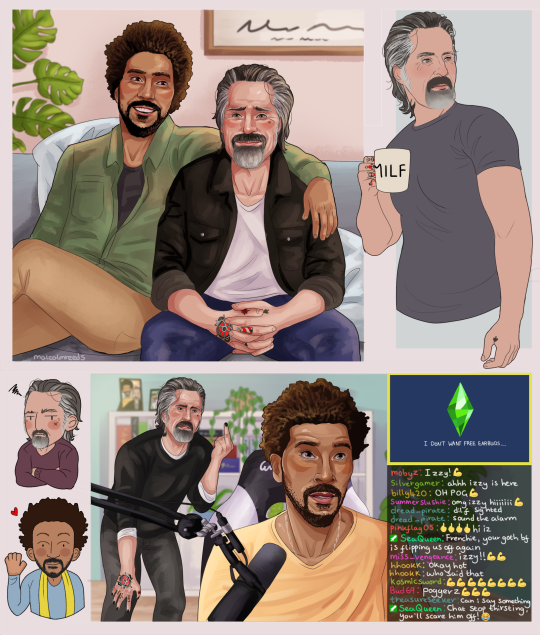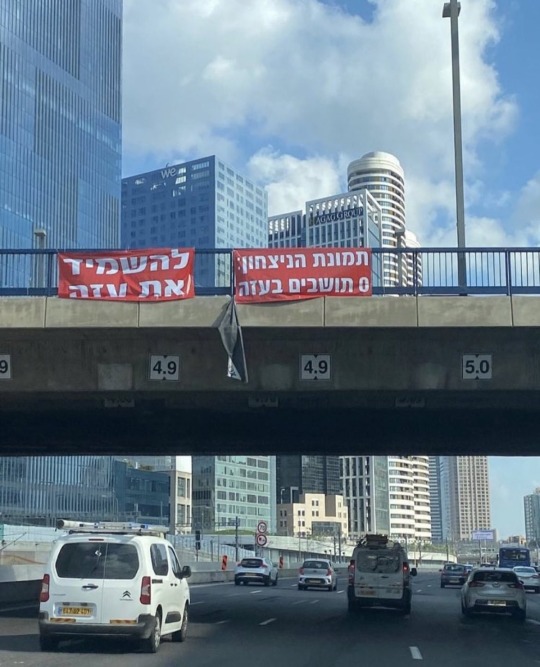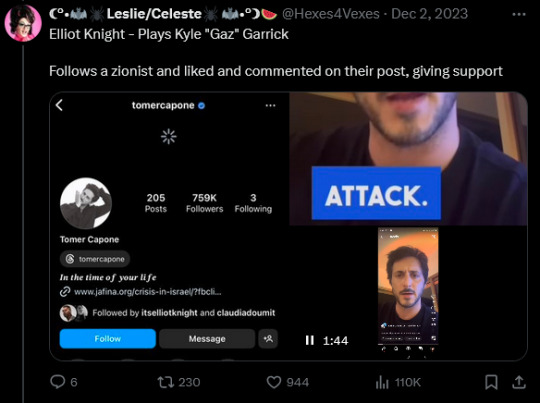#modern israel
Explore tagged Tumblr posts
Video
youtube
Does modern Israel play a role in End Times? Ask NT Wright Anything Podcast
Modern Israel plays no part in the end times. There is no biblical reason for Christians to support Zionist Israel.
0 notes
Text





Title:
Desecrated nostalgia
Origin:
Drawing without reference for "drawing from the imagination" class on the theme of architecture
Description:
The past is a foreign country, and not just literally. I never visit Israel because the place I grew up in no longer exists. A dissonant boxy building breaks the organic harmony of Mediterranean architecture and wholesome memories.
#architecture#mediterranean architecture#dissonance#nostalgia#childhood memories#water based markers#watercolor#modern israel
0 notes
Text
Shocking footage exclusively published by Al-Jazeera shows Israeli occupation forces demolishing the ancient Greater Mosque in Khan Yunis. Another video from an Israeli soldier's GoPro captures the raiding of a mosque and the burning of all Quran copies inside.
12K notes
·
View notes
Text
Israel: “Palestine” is the Jewish homeland, actually. It belongs to us. We will use it better than the Arab squatters.
Israel: *bombs the land into an inhospitable hellscape* *introduces invasive species* *destroys native flora* *destroys infrastructure* *destroys cultural landmarks and heritage sites* *genocides Palestinians, including the Jews that have lived there for generations before Israel’s creation* *disregards the unique needs of the region’s current biome to recreate a European one* c:
#israel#palestine#i am saying that israelis mimic europe’s antagonistic repationship with land#i am saying that the ancient israelis would think modern israelis are fucking insane
3K notes
·
View notes
Text
I love thinking about how my Ivri ancestors’ languages were Hebrew and Aramaic, and my grandparents’ languages were also Hebrew and Aramaic. Thousands of years apart and both of those tongues were still natural to them. Everything is so different now, but nothing has really changed, huh.
#even my mother who grew up in 70’s Israel and was embarrassed whenever her mum spoke Lishan Didan to her in public#she can fully understand it#I grew up saying a bracha after a shower that was mixed between old Aramaic and modern Hebrew#all of time really is just happening around you when you’re a Jew#jumblr#jewish stuff#jewish joy
78 notes
·
View notes
Text
Israel is Antichrist, God will not bless the USA, until the USA stops supporting Antichrist. It was also Israel that attacked the USA on September 11. Tha evil Zionist state has absolutly no right to exist. The only reason to pray for Israel is that Christians are instructed to pray for their enemies. Israel is probably the biggest enemy of Christians in the world toy. The Book of Revolution is all about Israel being Antychrist. God divorced them for good when the not only failed to accept God when he came to them in person in the form of Jesus, but also crucified them. The Christian church has replaced Israel as God's chosen people. All biblical prophecy about Israel was fulfilled in the old testiment and ended with the Roman distruction of Jerusalem in AD 70. There is absolutly no legitmite reason for the modern Zionest state to exist.

Israel is at war! Please pray for Israel...
69 notes
·
View notes
Text
steddyhands au where Stede & Izzy start fake dating to scam a load of money (either to secure Stede's inheritance, or just like a classic wedding gift scam or something) but they also still both kinda hate each other and are constantly bickering, and keep slipping up and raising suspicion & have to dig themselves a deeper and deeper lie to keep the ruse up
(meanwhile, Stede AND Izzy have independently started fucking Ed behind each others back. Ed thinks hes seeing a wonderful polyamorous couple who just arent interested in threesomes, meanwhile Izzy and Stede are desperately trying to keep the other from finding out theyre sleeping with someone else)
(yes they hate each other and arent even dating for real. yes they are sneaking Ed behind the others back like its a real affair. its stizzy)
#ngl directly inspired by the book sage is reading. except that is far more dramatic and a whole. scheme#i think they just want to secure stedes inheritance or smthn#make some money and bail#pay for izzys transition#something like that#(obviously in the end they all get together and its happy and wonderful and love. but i am here for the dramaaaa)#ed is the thing that gets them on the same page finally#after a blow up 'youre cheating on me!' fight ofc#(theyre like. why do YOU care. its not real! and then they realise they may in fact like it to be real)#nyxtalks#ofmd#our flag means death#izzy hands#israel hands#stede bonnet#edward teach#stizzy#gentlehands#steddyhands#canon era? modern au? who knows. not relevant#the only thing that matters is them being messy#one of the schemes they start to cover up a lie IS going to involve wee john wearing a dress#to be izzys mother. a (fake) duchess#(more book plot thievery. cept they had the mafia??? dude idk)
78 notes
·
View notes
Text


snapshots from my ofmd ouizzy modern au 💛🖤
#our flag means death#ofmd#ouizzy#izzy hands#israel hands#frenchie#frenchie ofmd#ouizzy modern au#my art#ive been working on this all month and have had so much fun
337 notes
·
View notes
Video
youtube
Does modern Israel play a role in End Times? Ask NT Wright Anything Podcast
The whole world is now God’s Holy land. The Chosen people are now the Christian Church. Jesus is the real Temple.
1 note
·
View note
Text
Thank you Jews of Kaifeng for creating lists of names (not just of men, but of women too!) and naming conventions. Wish every Jewish society did that.
#i'm potentially writing a paper on jewish naming conventions in the early modern period#and yikes#like the bene israel? mostly working with modern names#anu is a great help but they only go back so far#ahhhhhh#jewish#jumblr#judaism
43 notes
·
View notes
Text

Banners saying "Genocide Gaza" and "Victory looks like zero people in Gaza" hanging in Tel Aviv
21K notes
·
View notes
Text

Jews from Jerusalem, modern-day Israel
French vintage postcard
#modern-day#briefkaart#photography#vintage#modern#tarjeta#postkaart#french#postal#israel#photo#postcard#jerusalem#historic#carte postale#ephemera#jews#sepia#ansichtskarte#postkarte
86 notes
·
View notes
Text



Happy 4th of July! May this country crumble into nothing more than a hellish memory so that the rest of the world might finally be free.
#yes i know that is the original usa flag#unfortunately i did not have a modern one on hand#and i wasn’t giving some company money just so I could burn it#anyway#death to america#death to the usa#death to israel#death to the west#death to imperialism
91 notes
·
View notes
Text
Remember that a ton of CoD actors/voice actors are horrible people <3


List of every Call of Duty actor actively supporting zionism
^ a thread of actors that have liked/shared zionist propaganda
You can like the games, but know what it's standing for
#call of duty#simon ghost riley#cod mw2#cod#john soap mactavish#cod mwii#phillip graves#kyle garrick#kyle gaz garrick#captain john price#john price#john price cod#captain price#task force 141#gromsko#valeria garza#valeria cod#valeria mw2#cod mwiii#cod mw3#call of duty modern warfare 2#cod modern warfare#call of duty modern warfare#free palestine#free gaza#fuck israel
150 notes
·
View notes
Text
I can not support the terrorist ccountry that attacked the USA on September 11 2001. Any Amrericans that support modern israel are traitors to the USA. modern Israel is not the Israel of the Bible so Christians have no duty to support it. The Christian Church has replaced israel as God's Chosen People.
All Americans who are not traitors should stand against Israel! Yes pray for them as we should pray for and love our enemies. They are certainly not our friends!

Israel is at war! Please pray for Israel...
69 notes
·
View notes
